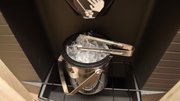Blog
Good Selling Techniques Clear The Way To OCS Profit
June 15, 2015 | Len Rashkin
TAGS: Vending Times columnist, OCS salespeople, office coffee service, office coffee sales, OCS education, OCS customer service, coffee business, office refreshments, OCS sales training, Len Rashkin, Len Rashkin's Golden Rules in Selling |
Over the past 47 years in the office coffee service arena, I have learned much about sales from my own observations and experiences, as well as from many of my fellow operators throughout the U.S. and Canada. During that time, I developed my "Golden Rules in Selling." The principles behind them have been proven over the years, but they still are not as well known as they might be.
Keep in mind that there are many sales techniques and styles that all of you use. These particular suggestions and techniques work well for me, and for most of the salespeople I have trained. My 11 Golden Rules of Selling are as follows.
No. 1 is to encourage your prospects to tell you what they really want from the service you're offering them. The simplest way to do this is to ask them to evaluate their present services. The question might be: "On a scale from one to 10 -- 10 being the highest grade -- how would you rate your current service or system?" Wait for the prospect's answer and, if it is anything less than a 10, ask: "What areas are you unhappy with, that would have made your answer a 10?" Now use the answer(s) to sell your service.
No. 2 states "Sometimes the best account is the one you let your competitor have." I am sure that many of you have encountered a buyer who continually tries to bleed you on pricing and the quantity of products that you include in your program. This person is never satisfied and continues to push you against the wall. When you have finally agreed on terms and you begin to service the company, you receive a phone call from the decision-maker that a competitor has just made a better offer. Well, it is time to just say goodbye to this account -- and let your competitor suffer more than you did.
No. 3 holds "If you sell by price, you lose by price." When price is the only reason you land a new account, in time someone will offer an even lower price and you will lose it.
Rules two and three are related. So the bottom line is walk away from these sales scenarios.
No. 4 emphasizes "The coffee break was designed to keep your staff in the office." This leads into a presentation that makes the following points: "If you are spending money for your employees' coffee and they are still leaving the office to buy a better cup, then you have defeated the purpose of having free coffee. For just a few extra pennies per cup, you can take back control of your coffee break." This rule relates to the next.
No. 5 says "The most expensive coffee is the coffee that is not consumed by your staff, but is brewed and then dumped down the drain." These statements lead to selling a better-quality coffee to your accounts or prospects than what they have been drinking.
No. 6 is an ancient rule, but is as valid now as it ever has been: "When reviewing a buyer's current brewing system, never criticize that system." The brewer that the prospect is using may have been chosen by the buyer to whom you are speaking, and sneering at it may offend that decision-maker. What you need to say is: "The system you now have was a good choice at the time, but now new technology has been developed that will enhance your refreshment break even further. May I show you what is new?"
No. 7 is widely applicable: "Never give out literature to your prospect to read while you are doing your presentation." Hold the illustrated sales brochure or folder in your hand; show parts of it when needed, and then leave the pictures with the prospect, if you want, only when you are finished presenting. If you give someone something to read or view, they will be distracted by it and not hear what you are saying.
No. 8 is critical to many service businesses: getting an answer to the question: "How many employees do you have on your premises daily?" The worst offense you can commit is to provide a prospective customer with the wrong size brewer. If you over-equip, you will be waiting too long to recoup your investment; and if you underequip, you will have unhappy customers waiting in line for their coffee -- and you've opened the door to competition who promises to provide the right equipment. Always find out how many part-timers work in the location, and whether there is any particular time when a large number of employees who usually work elsewhere may be visiting the office. This often happens when a company brings all of its salespeople or reps coming in for a meeting.
No. 9 also goes back a long way, but never loses its relevance: "A sale is not a sale until it is paid for." This lesson was instilled in me in 1974 by one of the pioneers in our industry, the late Arlo Roberts who ran United Coffee Cos. in Grand Prairie, TX. Sometimes an account is so easy to get because your competitors have been burnt by its failure to pay its bills. So it's important to look around the prospect' facilities and see whether you find evidence of problem. A warning sign to consider is a company that has few employees in a large office setting. It may be on its way out and desperate to keep some benefits during the rush to downsize. When in doubt, get a credit report or provide an older brewer, just in case they abscond with your equipment.
No. 10 is the immortal trial close, "Ms. Buyer, if I can get authorization for this price, will you start service with our company next week?" This closing statement is used when a buyer asks for special pricing or something out of the ordinary. You can tell them you have to call your sales manager to get permission, and then make the above statement to close the deal if you can get it for the prospect.
No. 11, finally, is a rule that dates back to the origins of cold-call selling and applies to all the other in-person approaches: "Make a friend of the gatekeeper (receptionist)." Your competition will always be around the corner, and it is important to keep them out of your accounts. Make a small investment and, around the holidays, give a small gift to the receptionists at your larger accounts. They will stop your competition before they can get into the buyer's office.
There you have them, and hopefully you will incorporate some or all of these suggestions in your sales presentations, if you're not using them already. Let me know some of your "golden rule sales techniques." I can be reached at (516) 241-4883 or ocsconsultant@aol.com.
LEN RASHKIN is a pioneer in office coffee service. He founded Coffee Sip in 1968 and later merged it with Dell Coffee, of which he became president in 1991. Sales at Dell topped $7 million. He also founded the Eastern Coffee Service Association and National Beverage & Products Association. He is a speaker at national and local trade conferences, consults on OCS sales and marketing, and is the author of two OCS training programs.







